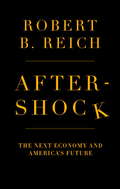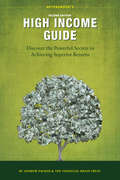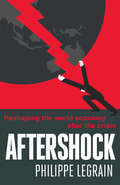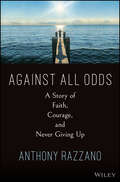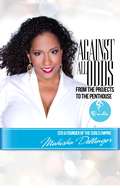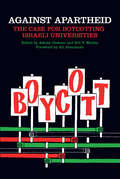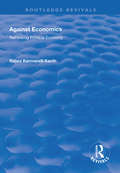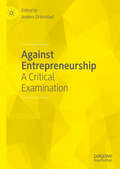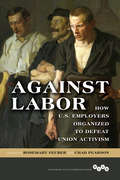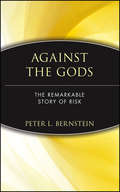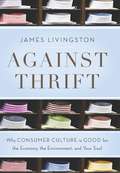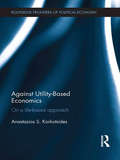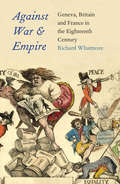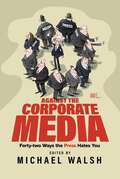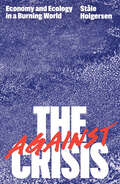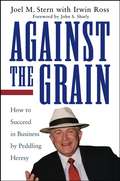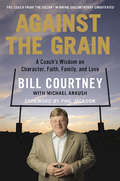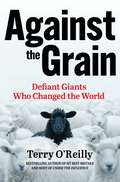- Table View
- List View
Aftershock
by Robert B. ReichA brilliant new reading of the economic crisis--and a plan for dealing with the challenge of its aftermath--by one of our most trenchant and informed experts.When the nation's economy foundered in 2008, blame was directed almost universally at Wall Street. But Robert B. Reich suggests a different reason for the meltdown, and for a perilous road ahead. He argues that the real problem is structural: it lies in the increasing concentration of income and wealth at the top, and in a middle class that has had to go deeply into debt to maintain a decent standard of living.Persuasively and straightforwardly, Reich reveals how precarious our situation still is. The last time in American history when wealth was so highly concentrated at the top--indeed, when the top 1 percent of the population was paid 23 percent of the nation's income--was in 1928, just before the Great Depression. Such a disparity leads to ever greater booms followed by ever deeper busts. Reich's thoughtful and detailed account of where we are headed over the next decades reveals the essential truth about our economy that is driving our politics and shaping our future. With keen insight, he shows us how the middle class lacks enough purchasing power to buy what the economy can produce and has adopted coping mechanisms that have a negative impact on their quality of life; how the rich use their increasing wealth to speculate; and how an angrier politics emerges as more Americans conclude that the game is rigged for the benefit of a few. Unless this trend is reversed, the Great Recession will only be repeated. Reich's assessment of what must be done to reverse course and ensure that prosperity is widely shared represents the path to a necessary and long-overdue transformation. Aftershock is a practical, humane, and much-needed blueprint for both restoring America's economy and rebuilding our society.From the Hardcover edition.
Aftershock's High Income Guide
by Andrew PackerThe High Income Guide examines all of the major factors that need to be considered in order to make sound financial decisions, such as taxes, inflation, and government debt and spending. The guide walks the reader through the many different financial instruments in an easy-to-read format, offering sample portfolios for every investment style. Charts, graphs, and examples provide both the new and seasoned investor with a comprehensive reading experience.
Aftershock: Reshaping the World Economy after the Crisis
by Philippe LegrainThe financial crisis brought the world to the brink of economic breakdown. Now bankers' bonuses are back, house prices are rising again and politicians promise recovery while unemployment rises, frictions with China grow and the planet overheats. Is this really sustainable?In this incisive assessment of the post-crisis world, Philippe looks at what went wrong, and how the world's leaders and financial institutions can learn from their disastrous mistakes. Reporting first-hand from around the world, he explains how the world economy is being reshaped and what it means for jobs and our future prospects. He sets out the huge dangers ahead - and the opportunities to craft a fairer, safer, richer and greener world in this wide-ranging, brilliant and impassioned book.
Against Aesthetic Exceptionalism (Forerunners: Ideas First)
by Arne De BoeverReconsiders exceptionalism between aesthetics and politics Here, Arne De Boever proposes the notion of aesthetic exceptionalism to describe the widespread belief that art and artists are exceptional. Against Aesthetic Exceptionalism challenges that belief by focusing on the sovereign artist as genius, as well as the original artwork as the foundation of the art market. Engaging with sculpture, conceptual artwork, and painting by emerging and established artists, De Boever proposes a worldly, democratic notion of unexceptional art as an antidote to the problems of aesthetic exceptionalism.Forerunners: Ideas First Short books of thought-in-process scholarship, where intense analysis, questioning, and speculation take the lead
Against All Odds: A Story of Faith, Courage, and Never Giving Up
by Anthony RazzanoAn extraordinary story of faith and healing in the face of tragedy In Against All Odds, NFL agent, Certified Public Accountant, husband, and father Anthony Razzano delivers an inspiring tale of resilience and perseverance in the face of almost unimaginable hardship. Caught in a catastrophic fire when he was only twelve years old, the author defied the odds—and the grim prognoses offered by his doctors—to become the starting outside linebacker for the New Castle Red Hurricanes under legendary coach Lindy Lauro. You’ll read about how the young Razzano endured months of grueling rehabilitation, 43 surgeries, 134 blood transfusions, and years of physical therapy only to emerge even stronger on the other side. The book offers: The transformational narrative of the author’s almost unbelievable story of tragedy and endurance A beacon of hope to the millions of children, parents, and athletes moving through their own journeys Fuel for your own faith and spirit as you encounter and withstand life’s ordinary and extraordinary challengesA singular and awe-inspiring exploration of one boy’s successful attempt to persevere through nearly unbearable burdens, Against All Odds is an inspirational and transformative story you won’t be able to put down.
Against All Odds: From the Projects to the Penthouse
by Mahisha DellingerFor Mahisha Dellinger, life in the rough streets of Sacramento, California was paving the way for a lifetime of poverty, despair and dysfunction. But while criminals ran rampant, gangs took over, and her own relatives chose drugs over dreams, Mahisha knew she was destined for something greater. Determined to write a different ending to her story, Mahisha set out to alter her destiny, through college and hard work. But her dreams were bigger than just a 9-5 job and she worked tirelessly to pursue her passion of owning her own hair care business. That dedication and commitment has paid off as Mahisha's company, CURLS LLC, is one of the leading natural hair care companies in the country.Against All Odds chronicles Mahisha's journey from the projects to the penthouse, how she overcame an impoverished beginning to lead a life of wealth, privilege and success....doing a job she loves. Complete with success tips to process in your own life, Against All Odds will show you how to turn your tragedy into triumph, no matter what the odds.
Against Apartheid: The Case for Boycotting Israeli Universities
by Ashley Dawson Bill V. MullenFocusing on the complicity of Israeli universities in maintaining the occupation of Palestine, and on the repression of academic and political freedom for Palestinians, Against Apartheid powerfully explains why scholars and students throughout the world should refuse to do business with Israeli institutions. This rich collection of essays is a handbook for scholars and activists.
Against Economics: Rethinking Political Economy (Routledge Revivals)
by Rajani Kannepalli KanthPublished in 1997, this postmodern critique provides a discourse on internal dynamics of the economics world view, suggesting for future societal wellbeing that we simply do not criticize economics but dispense it altogether. It argues that in the modern era economics have become obsolete as we live in a society riddled with corruption.
Against Entrepreneurship: A Critical Examination
by Anders ÖrtenbladThis book explores whether there is reason to be against entrepreneurship. Just like literature on the darker sides of entrepreneurs and entrepreneurship, the book is an answer to the one-sided, overly positive and uncritical image of entrepreneurship. The “twist” in this book, in comparison with literature on dark sides of entrepreneurship, is to explore being against entrepreneurship. From various perspectives such as lexical semantics, Marxism, philosophy of science and psychology, the contributors contemplate on why there may be reason to be against entrepreneurship discourse as well as entrepreneurship practice. Some chapters are based on first-hand empirical data, others are conceptual. The main overall conclusion is that there are some strong arguments for being against entrepreneurship discourse, as well as for being against certain aspects of entrepreneurship practice. Before it is reasonable to be against entrepreneurship practice in total, a convincing and practicable alternative needs to be developed. This book will be valuable reading for entrepreneurship scholars, as well as academics working in the fields of business ethics, (critical) management, and international business.
Against European Integration: The European Union and its Discontents (Economics in the Real World)
by Ivan T. BerendThis book gives a complex description and discussion of today’s populist attacks against the European Union (EU) following the financial crisis of 2008, which opened the floodgates of dissatisfaction, and the migration crisis which destabilized the traditional solidarity basis of the EU. The problem of Brexit is also explored. Each chapter presents one of the main elements of the crisis of the EU. These include West European populism, Central European right-wing populism in power, and the exploitation of the EU’s mistake during the migration crisis of the mid-2010s. These also include the discovery of Christian ideology against immigration and hidden anti-Semitic propaganda using a hysterical attack against the liberal billionaire philanthropist George Soros, and Brexit. There is a detailed discussion of the failures of the EU to pacify the neighbourhood in the South and North, especially in Ukraine, and the rising hostile outside enemies of the EU, including Russia and Turkey, bad relationships with Trump’s America, the uncertainty of NATO, and the emergence of a new rival, China, that enters into the Central European edge of the EU. The author explores strategies for coping with, and emerging from, this existential crisis and ends with the alternative plans and possibilities for the future of the eurozone. This will be an invaluable resource for understanding the crisis of the EU, one of the central questions of contemporary international politics for undergraduate and graduate students, and readers interested in the discussion surrounding an endangered European integration and difficult world politics.
Against Injustice: The New Economics of Amartya Sen
by Reiko Gotoh Paul DumouchelTraditional theories of justice as formulated by political philosophers, jurists and economists have all tended to see injustice as simply a breach of justice, a breakdown of the normal order. Amartya Sen's work acts as a corrective to this tradition by arguing that we can recognise patent injustices, and come to a reasoned agreement about the need to remedy them, without reference to an explicit theory of justice. Against Injustice brings together distinguished academics from a variety of different fields - including economics, law, philosophy and anthropology - to explore the ideas underlying Sen's critique of traditional approaches to injustice. The centrepiece of the book is the first chapter by Sen in which he outlines his conception of the relationship between economics, ethics and law. The rest of the book addresses a variety of theoretical and empirical issues that relate to this conception, concluding with a response from Sen to his critics.
Against Labor: How U.S. Employers Organized to Defeat Union Activism
by Chad Pearson Rosemary FeurerAgainst Labor highlights the tenacious efforts by employers to organize themselves as a class to contest labor. Ranging across a spectrum of understudied issues, essayists explore employer anti-labor strategies and offer incisive portraits of people and organizations that aggressively opposed unions. Other contributors examine the anti-labor movement against a backdrop of larger forces, such as the intersection of race and ethnicity with anti-labor activity, and anti-unionism in the context of neoliberalism. Timely and revealing, Against Labor deepens our understanding of management history and employer activism and their metamorphic effects on workplace and society. Contributors: Michael Dennis, Elizabeth Esch, Rosemary Feurer, Dolores E. Janiewski, Thomas A. Klug, Chad Pearson, Peter Rachleff, David Roediger, Howard Stanger, and Robert Woodrum.
Against The Gods
by Peter L. BernsteinA Business Week, New York Times Business, and USA Today Bestseller "Ambitious and readable . . . an engaging introduction to the oddsmakers, whom Bernstein regards as true humanists helping to release mankind from the choke holds of superstition and fatalism. " -The New York Times "An extraordinarily entertaining and informative book. " -The Wall Street Journal "A lively panoramic book . . . Against the Gods sets up an ambitious premise and then delivers on it. " -Business Week "Deserves to be, and surely will be, widely read. " -The Economist "[A] challenging book, one that may change forever the way people think about the world. " -Worth "No one else could have written a book of such central importance with so much charm and excitement. " -Robert Heilbroner author, The Worldly Philosophers "With his wonderful knowledge of the history and current manifestations of risk, Peter Bernstein brings us Against the Gods. Nothing like it will come out of the financial world this year or ever. I speak carefully: no one should miss it. " -John Kenneth Galbraith Professor of Economics Emeritus, Harvard University In this unique exploration of the role of risk in our society, Peter Bernstein argues that the notion of bringing risk under control is one of the central ideas that distinguishes modern times from the distant past. Against the Gods chronicles the remarkable intellectual adventure that liberated humanity from oracles and soothsayers by means of the powerful tools of risk management that are available to us today. "An extremely readable history of risk. " -Barron's "Fascinating . . . this challenging volume will help you understand the uncertainties that every investor must face. " -Money "A singular achievement. " -Times Literary Supplement "There's a growing market for savants who can render the recondite intelligibly-witness Stephen Jay Gould (natural history), Oliver Sacks (disease), Richard Dawkins (heredity), James Gleick (physics), Paul Krugman (economics)-and Bernstein would mingle well in their company. " -The Australian
Against The Tide
by Sandra Lazo de la Vega Timothy J. SteigengaAcross the United States, the issue of immigration has generated rancorous debate and divided communities. Many states and municipalities have passed restrictive legislation that erodes any sense of community. Against the Tide tells the story of Jupiter, Florida, a coastal town of approximately 50,000 that has taken a different path. At the beginning of the twenty-first century, Jupiter was in the throes of immigration debates. A decade earlier, this small town had experienced an influx of migrants from Mexico and Guatemala. Immigrants seeking work gathered daily on one of the city s main streets, creating an ad-hoc, open-air labor market that generated complaints and health and human safety concerns. What began as a local debate rapidly escalated as Jupiter s situation was thrust into the media spotlight and attracted the attention of state and national anti-immigrant groups. But then something unexpected happened: immigrants, neighborhood residents, university faculty and students, and town representatives joined together to mediate community tensions and successfully moved the informal labor market to the new El Sol Neighborhood Resource Center. Timothy J. Steigenga, who helped found the center, and Lazo de la Vega, who organized students in support of its mission, describe how El Sol engaged the residents of Jupiter in a two-way process of immigrant integration and helped build trust on both sides. By examining one city s search for a positive public policy solution, Against the Tide offers valuable practical lessons for other communities confronting similar challenges.
Against Thrift
by James LivingstonSince the financial meltdown of 2008, economists, journalists, and politicians have uniformly insisted that to restore the American Dream and renew economic growth, we need to save more and spend less. In his provocative new book, historian James Livingston-author of the classic Origins of the Federal Reserve System-breaks from the consensus to argue that underconsumption caused the current crisis and will prolong it. By viewing the Great Recession through the prism of the Great Depression, Livingston proves that private investment is not the engine of growth we assume it to be. Tax cuts for business are therefore a recipe for disaster. If our goal is to reproduce the economic growth of the postwar era, we need a redistribution of income that reduces corporate profits, raises wages, and promotes consumer spending.
Against Thrift
by James LivingstonSince the financial meltdown of 2008, economists, journalists, and politicians have uniformly insisted that to restore the American Dream and renew economic growth, we need to save more and spend less. In his provocative new book, historian James Livingston--author of the classic Origins of the Federal Reserve System--breaks from the consensus to argue that underconsumption caused the current crisis and will prolong it. By viewing the Great Recession through the prism of the Great Depression, Livingston proves that private investment is not the engine of growth we assume it to be. Tax cuts for business are therefore a recipe for disaster. If our goal is to reproduce the economic growth of the postwar era, we need a redistribution of income that reduces corporate profits, raises wages, and promotes consumer spending.
Against Utility-Based Economics: On a Life-Based Approach (Routledge Frontiers of Political Economy)
by Anastasios S. KorkotsidesUtility-based theory and the fallback choice-theoretic framework are shown to be biased, irremediably flawed and misleading. A radically different theory of value and of consumer behaviour is proposed based on existential interpretations of scarcity, value and self-interest. For self-conscious mortals, only time is scarce. All other is derivative scarcity. Value is in the life, as a knowledge extract of time, which goes into commodities as direct human labour and depreciated capital, through their production. By structuring their preferences, consumers try to confiscate more of such value per unit of expended income, extending their social presence, soothing their angst and gaining power over each other. This raises output and makes gains cancel out. Negative psychological externalities preclude any well-being or social-welfare type conclusion. These resolve a number of long-standing issues: endogenously generated growth, the micro-macro connection, the price mechanism, crises, unemployment, etc. Equilibrium is of a low-potential kind, not of a force-balancing one, and it is unique, reachable and stable. The relevant analytics involve purely economic, non-psychological entities. Consumer behaviour is grounded on a well-defined, structure-based decision criterion and on observably measurable magnitudes, only. The social ramifications of the two juxtaposed perspectives are discussed at length.
Against War and Empire
by Richard WhatmoreAs Britain and France became more powerful during the eighteenth century, small states such as Geneva could no longer stand militarily against these commercial monarchies. Furthermore, many Genevans felt that they were being drawn into a corrupt commercial world dominated by amoral aristocrats dedicated to the unprincipled pursuit of wealth. In this book Richard Whatmore presents an intellectual history of republicans who strove to ensure Geneva’s survival as an independent state. Whatmore shows how the Genevan republicans grappled with the ideas of Rousseau, Voltaire, Bentham, and others in seeking to make modern Europe safe for small states, by vanquishing the threats presented by war and by empire.
Against the Consensus
by Justin Yifu LinIn June 2008, Justin Yifu Lin was appointed Chief Economist of the World Bank, right before the eruption of the worst global financial and economic crisis since the Great Depression. Drawing on experience from his privileged position, Lin offers unique reflections on the cause of the crisis, why it was so serious and widespread, and its likely evolution. Arguing that conventional theories provide inadequate solutions, he proposes new initiatives for achieving global stability and avoiding the recurrence of similar crises in the future. He suggests that the crisis and the global imbalances both originated with the excess liquidity created by US financial deregulation and loose monetary policy, and recommends the creation of a global Marshall Plan and a new supranational global reserve currency. This thought-provoking book will appeal to academics, graduate students, policy makers, and anyone interested in the global economy.
Against the Corporate Media: Forty-two Ways the Press Hates You
by the-Pipeline.orgThe citizens of Western democracies have been relentlessly propagandized, lied to, and fed a steady diet of distortions and untruths by their media for decades. Editor Michael Walsh brings together a stellar collection of critical thinkers and writers to explain how and why this is happening, its negative effects on our democracies, and what we can do to reverse it.An informed electorate is a prerequisite for free and fair elections. But rather than striving for accuracy and objectivity, today&’s journalists openly celebrate the death of objectivity, arguing that they have a &“higher duty&” to reject the conservatism, police speech, and suppress news that contradicts the liberal narrative. Now, on the heels of his magisterial volume Against the Great Reset, editor Michael Walsh presents Against the Corporate Media, a collection of more than forty essays on the decline and fall of the American and international news media. The book&’s list of distinguished contributors includes Lance Morrow, Andrew Klavan, John O&’Sullivan, Elizabeth Nickson, Monica Crowley, Charlie Kirk, Glenn Reynolds, Steven F. Hayward, John Fund, Armond White, Michael Ramirez, Walsh, and others. Readers around the world deserve to know how badly their media has been corrupted, how eagerly they have embraced the role of official propagandists, and what a threat to democracy they have become. This book marks an important strike against the corporate media, and its unholy alliance with the enemies of freedom everywhere.
Against the Crisis: Economy and Ecology in a Burning World
by Ståle HolgersenCapitalism produces crises and crises reproduce capitalism. We need an ecosocialist way outIf crisis defines our era, we need a coherent socialist policy in response. Ståle Holgersen delves into today&’s economic and ecological crises to demonstrate that they are not exceptions to an otherwise functioning system but integral to its operation. It is naive to see these upheavals as opportunities for reform or revolution. They are the bedrock of the status quo. Fortunately, the vicious circle sustaining capitalism is not founded on an iron law. Our historical mission in the face of the climate crisis is to create a historical exception to the rule. It is time for ecosocialism against crisis.
Against the Grain
by John S. Shiely Irwin Ross Joel M. SternThe unique story of a business heretic and his concept of Economic Value Added (EVA)In Against the Grain, Joel Stern shares for the first time, not only the story of how EVA swept the corporate world, but the story behind the story-the intellectual underpinnings of EVA, how he and his colleagues at Stern Stewart & Co. promoted the concept, won its initial acceptance by major corporations, and later turned the concept into a revolution. He has for good reason been called a one-man catalyst for change. In an engaging memoir, he has given us not only an account of his business strategy, but also provided fascinating anecdotes and vignettes of encounters with leading businessmen on four continents.Joel M. Stern (New York, NY) has been the Managing Partner of Stern Stewart & Co. since its founding in 1982 and was coauthor of The EVA Challenge (Wiley: 0-471-40555-8). A recognized authority on financial economics, corporate performance measurement, corporate valuation, and incentive compensation, he is a leading advocate of the concept of shareholder value.Irwin Ross (New York, NY) was retained to write The EVA Challenge with Joel Stern and John Shiely. He is a former roving editor of Reader's Digest and over the years has written for Fortune and a variety of other magazines.
Against the Grain: A Coach's Wisdom on Character, Faith, Family, and Love
by Michael Arkush Bill Courtney Foreword by Phil JacksonIn Against the Grain, Bill Courtney shares his convictions on the fundamental tenets of character, commitment, service, leadership, civility, and others that, in his decades of success as an entrepreneur and educator, have proven to be the keys to a winning and meaningful life and career. Each chapter tells the story of one of these tenets through compelling anecdotes of the colorful characters in Bill’s life, leading to a deeper understand of the meaning of each and how to employee these fundamentals in all aspects of one’s life. Against the Grain intertwines inspiring and thought-provoking anecdotes, lessons, and amazing real life examples. Bill’s passion for us all to reconsider our own approach to life and constantly improve upon it comes across on every page.
Against the Grain: Defiant Giants Who Changed the World
by Terry O'ReillyNew from the bestselling author and host of CBC Radio’s Under the Influence In Terry’s bestselling book, My Best Mistake, he uncovers the surprising power of screwing up. Now, he turns his incredible eye to the mavericks who go “against the grain” in their work to see what makes them tick and to explore what lessons we can learn from them. People who chose to ignore conventional wisdom, found or invented a better way, questioned the status quo at great sacrifice and pushed for change against all odds. Some were drummed out of their careers for it but in the end were proven right (Dr. Ignaz Semmelweis). Some were celebrated but had to fight every inch of the way (Norman Lear). Some re-invented their industry but preferred to stay an outsider (Tom Laughlin—aka Billy Jack). Some confounded their competitors with ingenious strategies (NHL coach Roger Neilson). One even saved millions of people around the world, but was humiliated, demoted, and dismissed for her entire career (Dr. Katalin Karikó—co-creator of the COVID vaccine). All persistent visionaries, each covered in battle scars.
